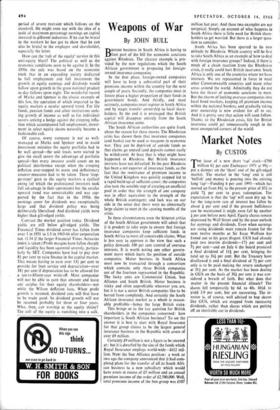Weapons of War
By JOHN BULL
DIRrrisii business in South Africa is having to foot part of the bill for economic sanctions against Rhodesia. The clearest example is pro- vided by the new regulations which the South African government is proposing for foreign- owned insurance companies.
In the first place, foreign-owned companies will have to keep a substantial part of their premium income within the country for the next couple of years. Secondly, the companies must in future place a higher proportion of their funds in government bonds. And thirdly, and most seriously, companies must register in South Africa and by stages transfer ownership to local share- holders. In the end it is envisaged that British capital will disappear entirely from the South African insurance scene.
The South African authorities are quite frank about the reason for these moves. The Rhodesian crisis has shown them that insurance companies (and banks) can be used as weapons in economic war. They can be deprived of outside funds so that claims go unpaid (and deposits cannot easily be withdrawn). At least that is what might have happened in Rhodesia. But British insurance interests have not defaulted. In the past Rhodesia has been a net exporter of insurance funds, so the fact that the remittance of premium income to the United Kingdom was quickly stopped led to a rapid build-up of sufficient cover; the companies also took the sensible step of creating an unofficial pool in order that the strength of one company was in effect equivalent to the strength of the whole British contingent; and luck was on our side in the sense that there were no abnormally large claims to meet in the opening months of the crisis.
In these circumstances even the bitterest critics of the South African government will admit that it is prudent to take steps to ensure that foreign insurance companies keep sufficient funds in South Africa to meet all conceivable claims. What is less easy to approve is the view that such a policy demands 100 per cent control of overseas interests. It is worth noting one other govern- ment move which hurts the position of outside companies. Motor business in South Africa must now be transacted through a consortium which contains only three British companies out of the fourteen represented in the Republic. The lucky ones are Commercial Union, Sun Alliance and South British. Motor business is tricky and often unprofitable wherever you are, but it is not a sector British companies like to be barred from completely. And certainly the South African insurance market as a whole is reason- ably profitable—hence the large British stake.
This brings us to the key question for British shareholders in the companies concerned: how important is South African business? To see the answer it is best to start with Royal Insurance for that group claims to be the largest general insurance business in the Republic with assets of over £9 million.
Certainly £9 million is not a figure to be sneezed at: but it is dwarfed by the size of the funds which Royal Insurance employs world-wide--£612 mil- lion. Next the Sun Alliance position: a week or two ago the company announced that it had com- pleted plans for the transfer of all its South Afri- can business to a new subsidiary which would have assets in excess of £5 million and an annual premium income of the order of £2,500,000. Well, total premium income of the Sun group was £107 million last year. And these two examples are not untypical. Simply on account of what happens in South Africa there is little need for British share- holders to get worried. But there is a larger ques- tion to consider.
South Africa has been spurred to its new attitude by Rhodesia. Which country will be first to take South Africa as an example of how to deal with foreign insurance groups? Indeed, if there is much of a chain reaction from the Rhodesian crisis, it really could hurt British insurance. South Africa is only one of the countries where we have interests. We are represented in force in most other Commonwealth countries and many other areas around the world. Admittedly they do not have the threat of economic sanctions to meet. But the charm of locking overseas companies into local bond markets, keeping all premium income within the national borders, and gradually taking over ownership is now evident for all to see. And it is pretty sure that action will soon follow. Thanks to the Rhodesian crisis, life for British insurance could get unnecessarily tough in the most unexpected corners of the world.






































 Previous page
Previous page